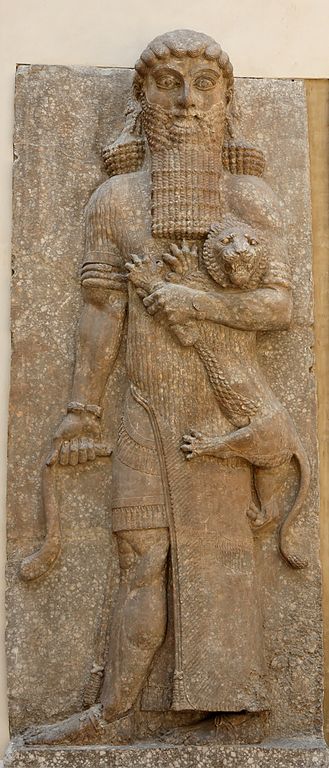
Name: Enkidu, “Enki’s Creation”
Tagline: Created by the god Aruru from clay and spit to humble the hero, Gilgamesh, he starts off as a wild man, until he is civilised by a temple prostitute. He becomes friends and fast companions with Gilgamesh
Claim to Fame: being Gilgamesh’s right hand man for much of The Epic of Gilgamesh.
In drama, there’s a maxim that is less well known, but equally true, in roleplaying: You can’t build up your own character’s status – everybody else builds your status. In Conan Doyle’s stories, Dr. Watson affirms Holmes as clever, and Moriarty affirms him as a moral person. That is why it’s important for a hero to have good villains – and good sidekicks.
Enkidu is one of the world’s first sidekicks, appearing in The Epic of Gilgamesh, a work that can be traced back to at least 2100 BC. That story is, you’ll be majorly surprised to learn, has Gilgamesh as its main character. Gilgamesh is two-thirds god and one third man, and rules the city of Uruk with an iron fist. He exercises the right of prima nocte, sleeping with a bride on her wedding night, and makes demands of the men. His harsh rules makes the citizen cry out to the gods.
And the gods hear the prayers of the people. The creator goddess, Aruru, mixes spit and clay to create the man Enkidu, who is made to be an equal opposite to Gilgamesh. He is equally strong and handsome. But where Gilgamesh is civilised and cultured, Enkidu is wild. He runs on the fields with the herds, and drinks with them from the pond.
Enkidu is spotted by a hunter as the wild man is freeing animals from the hunter’s trap. The hunter then goes to Gilgamesh to ask him to do something about the wildling. Gilgamesh responds by sending Shamhat, a holy prostitute, to deal with Enkidu.
Enkidu and Shamhat spends six days and seven nights together. When Enkidu tries to go back to the flock after that, the herds recoil as he approaches, smelling Shamhat upon him. Thus he goes back to Shamhat, and she teaches him to be a civilised man.
They then go back to Uruk. In the city, Enkidu and Gilgamesh wrestle, and the king defeats the Enkidu. After that, they become inseparable companions, travelling together for many adventures. They travel to the Cedar Forest to kill Humbaba, the lion headed monster who rules the forest, then they cut down the trees. Later on, Gilgamesh angers the goddess, Ishtar, by rejecting her advances. She then asks her father to send the Bull of Heaven down to earth to punish Gilgamesh. But Gilgamesh and Enkidu together defeat the bull.
This angers the gods even more, and they strike down Enkidu with a wasting sickness. After his death, Gilgamesh refuses to bury him for a long time – until a work falls from his nose, to be exact. Then the mortality of his friend spurs Gilgamesh on to go on a quest to find a way to gain immortality – a quest he ultimately fails.
Enkidu is, as I said, an opposite reflection of Gilgamesh, and apparently, he is described as being similar to Gilgamesh. But where Gilgamesh is cultured and domesticated, Enkidu is feral and wild.
He also develops a very close bond to the hero. Some Assyriologists have noted that he always walks in front of the hero, and that while he is alive, Gilgamesh is never described as wielding his axe. But the moment he is dead, Gilgamesh starts carrying his axe as a protective weapon. In other words, he is the shield of Gilgamesh. He even goes so far as to take the fall for the king, dying from the sickness, when Gilgamesh is really to blame.
It would even seem that there is an erotic relationship between the two of them. It would appear there’s a case of opposites attract (though another view might be that Gilgamesh is in love with Enkidu because he looks like Gilgamesh).
When it all comes down to it, he is a really great example of a companion or sidekick. Building up the status of the hero, providing a counterpoint to him, and even dying for him, showing us that characters in this story can die – even the central once, I’ll have you know!
How would I use him: I’ve already established Enkidu’s status as a sidekick. If you need a companion for your hero, this guy might be a good place to start.
His origins are also interesting. Like the biblical Adam, he arises from clay or dirt, given life by an infusion of divine essence – spit for Enkidu, breath for Adam. Both start off ignorant of the norms of civilisation, living a carefree life, but is civilised by a woman. Though while Eve is portrayed in a very negative light, it seems Shamhat’s cultivation of Enkidu is seem as something positive.
He could also be considered similar to another Adam: Frankenstein’s creature. Both are created, and both are initially shunned by society. Though Enkidu’s transition is obviously a lot less painful than the Creature’s.
As an uncivilised being, he must join the ranks of the barbarian, like Conan. In some ways, though, he is closer to what Dungeon & Dragons would consider a barbarian: the straightforward fighting man, rather than the sly warrior.
And so, Enkidu is all of these things: a proto-sidekick, an example of a created being, and a barbarian hero. Plus, some might see him as part of the first couple ever shipped.